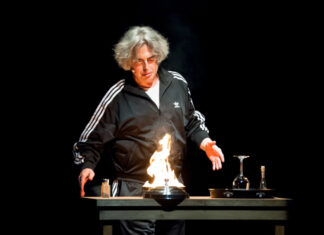Leggi italiano
Despite the clarifications brought up by Teatro Franco Parenti in Milan and many high-brows and religious people’s statements, the dispute is still alive around the Web. Romeo Castellucci replies with an open letter sent to the medias in which he explains his thoughts about the boycotted performance. We invite the readers to express their solidarity leaving a comment in the space below, outlining an informal petition. The fellow magazines and web publications are invited to spread the letter, hoping the information media to be a vehicle for freedom of speech and for a free artistic creativity.
This play comes from the extreme and highly regarded solitude of the Face of Jesus.
This play aims to investigate the trouble of taking the Fourth Commandment literally. Honour your father and your mother. In spite of everything, a son takes care of his own father, of the man’s incontinence, of his physical and inmost break down. The son has no real knowledge of this commandment, nonetheless in it he believes. Deeply. He goes all the way through it, till the end he accepts what seems to be the only inheritance of his father. His faeces. And, as well as the father, the son seems to clear himself of his being. The too human kenosis stands in the presence of the divine one.This play questions the decay of beauty, the mystery of the end. The excrements with which the incontinent father gets dirty are a metaphor of the human martyrdom as an ultimate and real condition. The excrements represent the ultimate reality of a creature, but also the daily vocabulary of a language of love used by son and father.
This play shows on the background the Salvator Mundi’s face painted by Antonello da Messina. The whole scene is a very simple sequence-shot which describes the son’s attempts to clean and to give a dignity back to the old parent. In vain. Jesus, Salvator Mundi (latin for Saviour of the World), is a mute witness of the son’s failure.
This play purposely chose Antonello’s paint because of the very gaze the painter impressed upon the indicible face of Jesus. This gaze is able to look into each spectator’s eyes. The spectator watches the scene but himself is continuously watched by the Face. These crossing gazes question and (doing that) force every viewer to consider himself as a spectator. The Son of Man, laid bare by mankind, now bares us. This Antonello’s portrait is no longer a paint, it becomes a mirror.
This play, when technical conditions allow it, plans the intervention of a group of children. From their satchels they take toy grenades and throw them on the portrait. It’s a crescendo. Every shot is acconpained by a loud noise. In the climax of explosions, first a voice whispers Jesus’ name, then others gather into a choir, repeating that name. At the end of this action and as it was created by the very shots, a chant begins: it’s Sisak’s “Gloria Patri – Omnis Una”. The bomb shots become the music of His name. No adults are present in this scene.
It’s the innocent against the innocent. The violence stays in the adult act, whilst the child wants the distracted parent’s attention. The child is hungry, as it’s said in the Psalm 88: “Why, Lord, do you reject me and hide your face from me?”This play, when technical conditions allow it, plans the diffusion of ammonia smell. Ammonia is the last possible transformation, for a man the final actual transubstantation, the last exhalation out of a dying human body: the mortal remains pass into gas, condense in a halo. The man’s “perfume”. It’s his greeting to the earth.
This play – just as the whole Western theatre is based on the problematic beauty of the Greek Tragedy – obeys the same rhetorical rules: it is antiphrastic, this to say that it uses extraneous and violent elements to convey an opposite meaning. Here the violence homeopathically signifies the search and the need for a human touch. As well as a kiss can signify the betrayal. This is the lesson of the Attic Tragedy: to step back, to make oneself inhuman in order better to understand human frailty.
This play belongs to the Sacred Writings. Ecclesiastes, Theodicy of the Book of Job, Psalm 22, Psalm 23, the Gospels. It’s the Tradegy leaned on the Bible.
This play shows, in the ending, black ink pouring out through the face of the Christ (not by a human hand). All the Sacred Writings’ ink seems to suddenly melt, revealing a further icon that crosses every image and gives us an empty space in return.This play shows the canvas ripped as a membrane, as a frozen image. An empty and dark space in which a glowing writing appears, engraved behind the portrait: “You are my shepherd”. It’s the famous verse of David’s Psalm 23. The writing of the Bible lost its ink in order to reappear in a luminous form. But when the lights are up a small word can be read between the others, painted in grey and almost invisible: “not”. So the verse can be also read as “You are not my shepherd”. Thus David’s verse falls into the doubt: are you or aren’t you my shepherd?
It’s the doubt of Jesus on the cross: “My God, why have you abandoned me?”, as it’s written in King David’s Psalm 22. This suspension, this lapse in the very verse identifies the core of Faith as a doubt, as light. And in the same time it’s the usual question: to be or not to be? Or rather to be AND not to be.This play is a blasphemy, as well as the cross is a Roman blasphemy, as well as the thorny crown is a Roman blasphemy, as well as the fact that Jesus was condemned because considered blasphemous. In the Exodus his calling the name of JHWH is taken as a blasphemy. Dante commits in fact a blasphemy in Inferno’s Canto. Before the Council of Nicaea, to venerate Christ’s face in the icons used to be considered blasphemy and idolatry by the Byzantine Christianity. Galileo is blasphemous when he claims that the Earth is round.
To see a father leaking out his own faeces around the house, in the kitchen, it’s blasphemy.“This play” is not correct, this is artist’s shit.
translatedy by Sergio Lo Gatto
leggi anche:
# Mariangela Gualtieri e Cesare Ronconi, a sostegno di Romeo Castellucci
# Lo spettacolo di Castellucci deve andare in scena. Un appello
# Atlante XIII – L’arte e il nuovo Medioevo
# Mass or mise en scène? A consideration about Catholic protests after Castellucci’s show in Paris
# Sul concetto di volto nel figlio di Dio: ovvero il destino dei Padri secondo Romeo Castellucci











